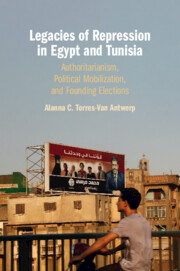 Legacies of Repression in Egypt and Tunisia
Legacies of Repression in Egypt and Tunisia Book contents
- Legacies of Repression in Egypt and Tunisia
- Legacies of Repression in Egypt and Tunisia
- Copyright page
- Dedication
- Contents
- Figures
- Tables
- Acknowledgments
- Introduction
- 1 Authoritarian Politics and Founding Elections
- Part I Members of the Club or the Only Game in Town?
- 2 Divided Opposition in Egypt (1981–2011)
- 3 Authoritarian Political Opportunity Structures in Comparative Perspective
- Part II Phoenix from the Ashes
- Part III Epilogue
- Appendix
- References
- Index
2 - Divided Opposition in Egypt (1981–2011)
from Part I - Members of the Club or the Only Game in Town?
Published online by Cambridge University Press: 10 March 2022
- Legacies of Repression in Egypt and Tunisia
- Legacies of Repression in Egypt and Tunisia
- Copyright page
- Dedication
- Contents
- Figures
- Tables
- Acknowledgments
- Introduction
- 1 Authoritarian Politics and Founding Elections
- Part I Members of the Club or the Only Game in Town?
- 2 Divided Opposition in Egypt (1981–2011)
- 3 Authoritarian Political Opportunity Structures in Comparative Perspective
- Part II Phoenix from the Ashes
- Part III Epilogue
- Appendix
- References
- Index
Summary
Chapter 2 provides an in-depth exploration of the more open state opposition structure of the Hosni Mubarak regime – which groups were co-opted, which were included and allowed to participate, and which were excluded from formal political participation – and traces the impact of these different types of opportunity structures on the political and outreach activities that different groups undertook. We see that opposition groups that were excluded from the formal political system, such as Islamist groups and pro-reform umbrella groups, adjusted their strategies in response to exclusion and were alternately tolerated and repressed by the regime. During periods of toleration, these groups – especially Islamist groups – were able to establish an extensive grassroots presence through charities, community self-help organizations, private mosques, and individual religious outreach activities. These activities at the grassroots level, while not always directly confronting the state, constituted the construction of a “parallel society” that quietly contested the regime’s legitimacy. During periods of repression, members of these groups retreated underground and into informal networks until they found new venues through which to engage with their communities.
- Type
- Chapter
- Information
- Legacies of Repression in Egypt and TunisiaAuthoritarianism, Political Mobilization, and Founding Elections, pp. 55 - 99Publisher: Cambridge University PressPrint publication year: 2022


